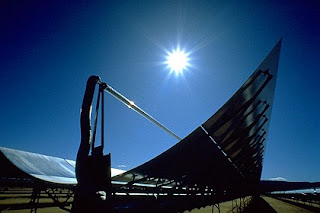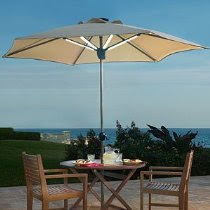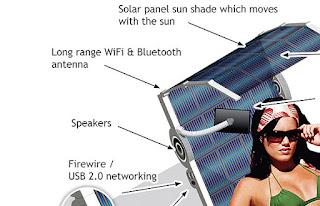 Solar thermal parabolic trough power plant;Source: Solar Millennium, TREC
Solar thermal parabolic trough power plant;Source: Solar Millennium, TRECThe EU scientists are calling for the creation of a series of huge solar farms - producing electricity either through photovoltaic cells, or by concentrating the sun's heat to boil water and drive turbines - as part of a plan to share Europe's renewable energy resources across the continent.
Speaking at the Euroscience Open Forum in Barcelona (ESOF), Arnulf Jaeger-Waldau of the European commission's Institute for Energy, explained how electricity produced in solar farms in Africa, each generating around 50-200 megawatts of power, could be fed thousands of miles to European countries by using high-voltage direct current (DC) transmission lines instead of the conventional alternating current (AC) lines. Energy losses on DC lines are far lower than AC ones where transmission of energy over long distances is uneconomic.
Depending on the size of the grid, building the necessary high-voltage lines across Europe could cost up to €1-billion a year every year till 2050, but Jaeger-Walden pointed out that the figure was small when compared to a recent prediction by the International Energy Agency that the world needs to invest more than $45-trillion in energy systems over the next 30 years.
Doug Parr, Greenpeace UK's chief scientist, welcomed the proposals: "Assuming it's cost-effective, a large-scale renewable energy grid is just the kind of innovation we need if we're going to beat climate change."
The idea for developing a major innovative super-grid based on renewable energy is already gaining political support in Europe, with both the UK Prime Minster Gordon Brown and and the President of France Nicolas Sarkozy, recently backing the north African solar plan.
The scientists say that harnessing solar energy from the Sahara would be especially effective, because the sunlight in that area is much more intense: solar photovoltaic panels in northern Africa could generate up to three times the electricity compared with similar panels in northern Europe. And it would require the capture of just 0.3%of the light falling on the Sahara and Middle East deserts to meet all of Europe's energy needs.
Source: http://www.guardian.co.uk/environment/2008/jul/22/solarpower.windpower?gusrc=rss&feed=environment
Note: An earlier article in Spiegel Online from April 30, describes the project and also how it will benefit Africa because it is important that such an ambitious development is sustainable and beneficial to both continents. Read more: "Is Desert Solar Power the Solution to Europe's Energy Crisis?"
For the original plan visit: http://www.desertec.org/concept.html








